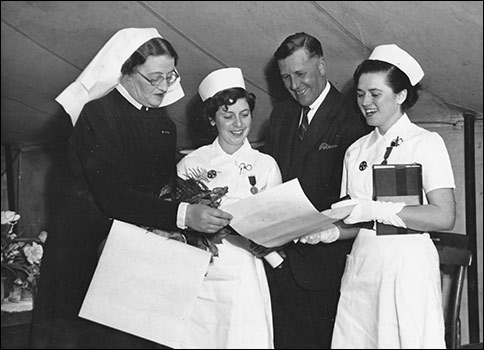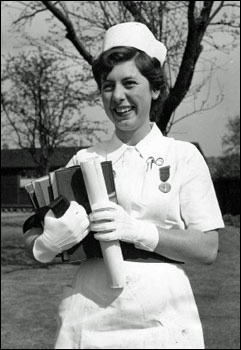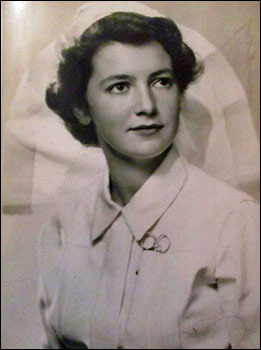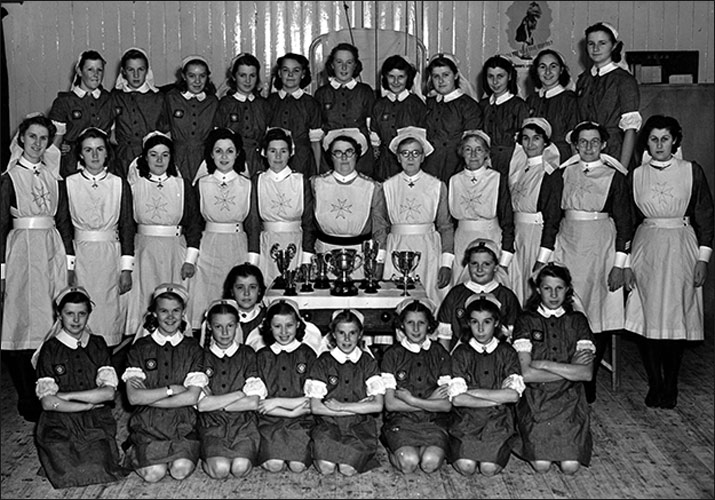|
The SJAB was, of course, the route to a full-time nursing career for some teenage girl members of the Burton Latimer Nursing & Cadet Division. The following was the experience of Toop sisters Mollie (later Mrs. Barrie MacKay) and Kathryn (later Mrs. Ian Fletcher), as related in better times by Mollie.
The Burton Latimer SJAB had an arrangement with Kettering General Hospital whereby the cadets would help-out on the Hospital wards for a few hours at a time, a scheme which had several advantages, not least affording the cadets themselves the opportunity to witness at first hand the good, the bad and the ugly of a full-time nursing career, to decide them on their futures; for the qualified nursing staff the cadets offered extra pairs of hands for menial tasks; and the scheme had a third advantage, affording Matron, the all-magisterial Hospital Matron (in this instance the well-known and much respected Agnes Jackson), the opportunity to assess individual cadets for their potential to undergo full-time nursing training.
Mollie was to spend many a Sunday on Timpson children's ward — and invariably came away thoroughly soaked, because Sundays were children's ward bath-day! She loved every moment of it, had clearly found her true vocation and must have impressed Agnes Jackson, for her application to start formal 3-year State Registered Nurse (SRN) training before reaching the statutory age of 18 years was accepted by the Hospital. On 1 July 1950, Mollie started full-time nursing at Kettering General — and so, too, did her sister Kath. When working together on Buccleuch male surgical ward at one point they were addressed as "Toop 1" and "Toop 2". Kath, of course, was too young to start her SRN training at that stage: she had been taken on as a Yellow Coat. Now, although they were an entertaining and mischievous bunch of teenagers, as Mollie recalled, we are not talking Maplins Holiday Camp "Hi-de-Hi" here: Yellow Coats at Kettering General were Assistant Nurses. Kath did go on to start her SRN training, but sadly for the nursing service never completed it. Matrimony intervened and, although held in high regard by the senior nursing staff and Mollie being co-opted into trying to persuade her to change her mind, it was not to be. Mollie, for her part, did complete her training, in 1953, and with flying colours, winning the Schilizzi Gold Medal for being the best nurse of her set.
 |
 |
|
Prize-giving Day at KGH on 8 May 1954 when Mollie received the Schilizzi Medal.
Left: Matron Agnes Jackson, Mollie, Dennis Hutchinson & Nurse Erna Bachner. Right: Mollie with her prizes
|
Having completed her training, Mollie had to wait until she had reached the statutory age of 21 years before she could be formally registered as a State Registered Nurse, which came about in late 1953. Following her training, Mollie spent a year as a Staff Nurse in the two operating theatres at the old Kettering General Hospital, the one for general surgery, the other for orthopaedic, during which she regularly scrubbed for the late Frank Radcliffe, he of today's eponymous Orthopaedic Department at Kettering General. A lovely man and excellent surgeon, Mollie recalled, Frank Radcliffe delighted nursing staff and patients alike by arriving for his Sunday morning rounds on horseback, hitching his mount to the front of the old Hospital whilst busy inside.
Mollie’s midwifery training was in two parts: the first, mostly hospital-based, was at Beckenham Maternity Hospital in Kent, the second, more out and about in the community, was at St Woolos Hospital at Newport in Monmouthshire, South Wales, The old hand midwife who took Mollie under her wing when she started doing home-births said to her, "Now, Mollie, when you arrive at the house, the first thing you do is send the husbands off to boil plenty of water" — not so much for purposes of hygiene, but to ensure that the midwives got a cup of tea! An item of equipment indispensable to the midwife out and about in those days was a sixpence (or at least small change), to enable her to summon help from the nearest telephone callbox should complications arise during the delivery — no smart, dumb, brick or any other form of mobile 'phone to hand in those days.
[Mollie would have been very conscious of her ability to summon help in an emergency, because, you see, the grandmother she never had the opportunity to know had died in just such circumstances. Poor 24-year old Alice Toop, and her unborn child were lost at Burton Latimer during Alice’s second childbirth. Modern midwives tell me that the circumstances in which Alice and her child were lost would not happen today: nowadays they could have been saved, but it was not to be in 1905, which should give us all reason to pause and reflect upon the risks that young mothers faced in childbirth in those earlier years.]
Having entered no fewer than ninety-nine deliveries in her midwife's log-book, Mollie qualified as a State Certified Midwife (SCM), this in Sep 1955. Returning to Kettering General Hospital, she was promoted to Nursing Sister and packed off by Agnes Jackson to St Mary's Hospital on London Road to join another sister running the night shift in the maternity unit there. Mollie’s career as a SRN/SCM was to span some forty-three years, the last thirteen as member of the nursing team in Kettering General’s Occupational Health Department.
As a teenager, Mollie never quite mastered the art of applying the brakes on her bicycle and one day came off it, head-first, ending up sitting at the kerbside bleeding profusely from a gash to her forehead. Another SJAB cadet was on hand to administer first aid, scouted around, acquired a tea-bag, applied it to the wound, and then thought, “Hold on a moment, teabags are for burns!” That cadet had a little way to go with her first aid training on the day Mollie came off her bike - or had she? Unbeknown to her at the time, a school of thought in modern medicine sees tannic acid in tea as a useful blood-clotting agent.
As a theatre nurse at KGH, subject to callout at any time during the night, Mollie was required to have a key to the front door of Warren Hill House. There was a strict curfew in force in those days: nursing staff had to be back in their quarters by ten o’clock sharp, when the front door of Warren Hill House was locked. This did not deter the “stop-outs”, of course, who, arriving late, would simply tap on Mollie’s ground-floor bedroom window, she would hand over her key, they would let themselves in, return the key and hope to be in bed before Matron caught them!
It was not uncommon at Newport for locals, learning that a midwife was in the neighbourhood attending an home-birth, to assemble outside, ready to ambush her when she emerged from the building. The fact that her presence there was essentially as a midwife did not matter: she was a “nurse”, and that is what counted. An impromptu, alfresco “clinic” in the street would follow. What the poor midwife, with negligible medical resources, was able to achieve in such circumstances is anybody’s guess, but no doubt she offered some helpful advice.
At Newport, Mollie often had to work alone in some “interesting” dockland areas, but never once did she have to worry about her personal welfare: nurses were treated with great respect in those days, as I am sure they are today [are they?]. In fact, such was the hospitality dished out to Mollie wherever she went during her midwifery training, Mollie considering it impolite to refuse all the treats thrust upon her by grateful families, that she packed on more weight then than at any other stage in her nursing career — prompting her male cousins back in Burton Latimer, of whom Mollie was very fond, to observe, rather unkindly, but much to Mollie’s amusement, that they had thought that all the barrage balloons were over at Cardington in Bedfordshire! Needless to say, Mollie soon shed all those extra pounds once back doing long shifts on the hospital wards,
Many people will have watched the popular television series Call the Midwife. “Never like that in my day,“ say the old SCMs, “they act more like district nurses!” — the distinction of which and why it should matter are rather lost on me.
 |
|
Mollie's sister Kathryn
|
|



